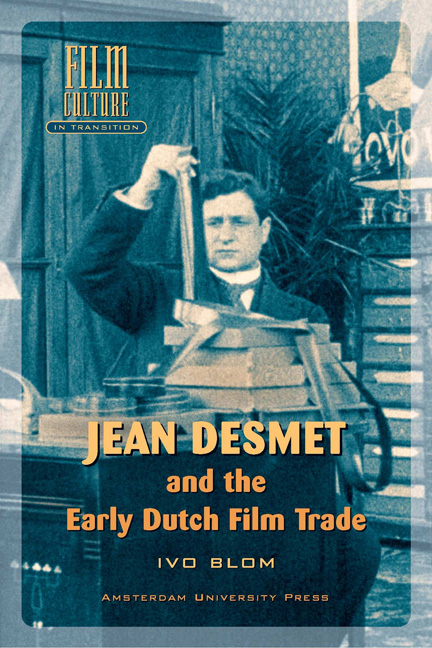Book contents
- Frontmatter
- Dedication
- Contents
- Preface
- Abbreviations, Unidentified Films and Historical Currencies
- Introduction
- I La Comète Belge: Jean Desmet’s Travelling Cinema, The Imperial Bio (1907-1910)
- II In The Beginning…: Film Distribution in the Netherlands Before Desmet
- III Gold Rush: In the Throes of Cinema Mania (1909-1914)
- IV Film Market Europe: Buying Films Abroad (1910-1914)
- V White Slave Girls and German Kultur: Film Rental and Distribution Strategies in the Netherlands (1910-1914)
- VI Onésime et Son Collègue: Competition (1910-1914)
- VII Das Ende vom Lied: The Impact of the First World War (1914-1916)
- VIII Quo Vadis?: Desmet’s Film Rental and Cinema Operation During the Great War (1914-1916)
- IX Afterlife: A New Career and the Beginning of a Collection
- X In Retrospect: Jean Desmet’s Place in Film History
- Notes
- Bibliography
- Photo Credits
- Film Culture in Transition
- Index of Film Titles
- General Index
X - In Retrospect: Jean Desmet’s Place in Film History
Published online by Cambridge University Press: 14 January 2021
- Frontmatter
- Dedication
- Contents
- Preface
- Abbreviations, Unidentified Films and Historical Currencies
- Introduction
- I La Comète Belge: Jean Desmet’s Travelling Cinema, The Imperial Bio (1907-1910)
- II In The Beginning…: Film Distribution in the Netherlands Before Desmet
- III Gold Rush: In the Throes of Cinema Mania (1909-1914)
- IV Film Market Europe: Buying Films Abroad (1910-1914)
- V White Slave Girls and German Kultur: Film Rental and Distribution Strategies in the Netherlands (1910-1914)
- VI Onésime et Son Collègue: Competition (1910-1914)
- VII Das Ende vom Lied: The Impact of the First World War (1914-1916)
- VIII Quo Vadis?: Desmet’s Film Rental and Cinema Operation During the Great War (1914-1916)
- IX Afterlife: A New Career and the Beginning of a Collection
- X In Retrospect: Jean Desmet’s Place in Film History
- Notes
- Bibliography
- Photo Credits
- Film Culture in Transition
- Index of Film Titles
- General Index
Summary
Within the historical retrospect of Desmet's business, there are six key themes. Allowing for certain significant differences, the Dutch situation resembles the open models of Britain and Germany cited in the Introduction. Desmet's development forms part of the institutionalisation of cinema at a critical moment in time. By following his development, we are able to trace not only changing exhibition practices but also shifts within the power structures of film distribution, both in the travelling cinema period and afterwards. His story shows how he was at various times a ‘winner’ or a ‘loser’, a modern or a conservative businessman; how he sometimes set the trend and at other times merely followed it. The task of reconstructing the history of Desmet's career teaches us to appreciate the value of a commercial archive as an historical source. And finally, in looking at things through Desmet's eyes, we are made more aware of the many changes that have taken place in cinema since its early days.
The Netherlands in an International Perspective: ‘Open’ and ‘Closed’ Situations
The changes taking place outside the Netherlands cannot be projected onto the Dutch situation without further ado. National developments are only to a limited extent part of international developments.
This applies particularly to the situation in France and the United States. In the early stages, the production companies in these countries formed a closed front with sweeping powers of control over film trading and cinema exhibition. During the heyday of the travelling cinema, the Netherlands had been heavily dependent on Pathé, but this situation changed dramatically after 1909. Henceforth, Dutch distributors chose their films for themselves, thanks to the arrival of permanent motion-picture theatres, independent distributors and the growing variety of films on offer. Schemes like the creation of the Belge Cinéma subsidiary, through which Pathé sought to incorporate both Belgium and the Netherlands, proved unsuccessful. Like Britain and Germany in the years before 1914, the Netherlands was a country where it was possible for anyone to import, distribute or hire movies.
It remains difficult to establish precisely to what extent the Netherlands adopted the closed system, which introduced the practices of block-booking and blind-selling that Kristin Thompson observes in Britain. In any event, the power of Dutch exhibitors and distributors did not come to an end, despite the restrictions of choice that followed the rise of Ufa and the American studios.
- Type
- Chapter
- Information
- Jean Desmet and the Early Dutch Film Trade , pp. 337 - 360Publisher: Amsterdam University PressPrint publication year: 2003



